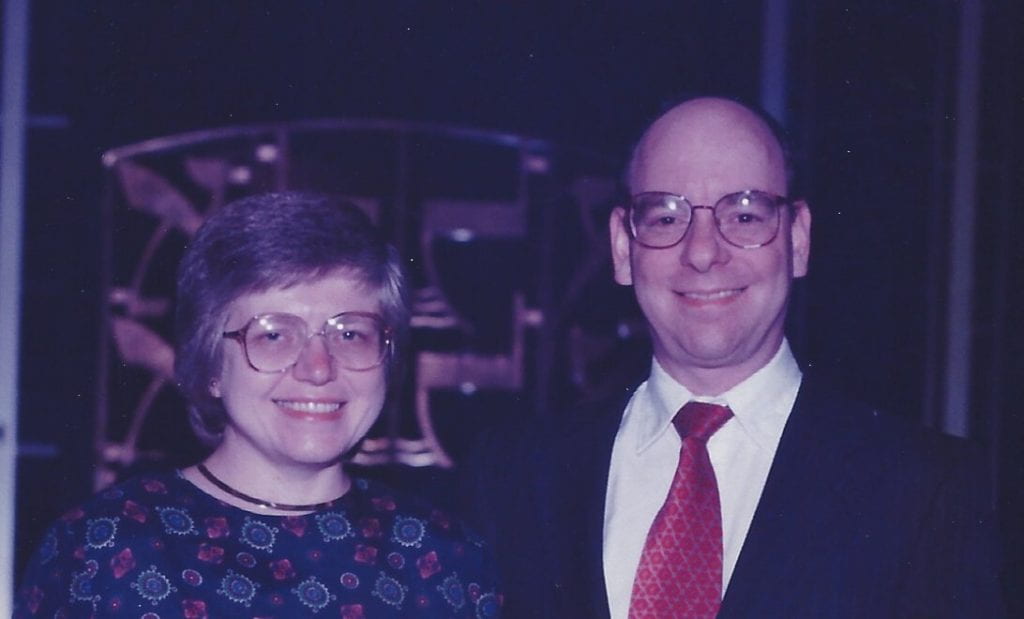I wave from across the Washington University School of Medicine’s Ellen S. Clark Hope Plaza to a man in a white doctor’s coat standing beyond the fountain. Martin B. Wice, M.D., Washington University physiatrist, gives a friendly wave back while walking toward me. Dr. Wice, or Marty, and I are meeting face-to-face for the first time to have lunch, but I already feel like I know him well. He has been working with me and two other InPrint Editors – Elise Alspach and Lizzy Mueller – to polish a personal essay about his late wife’s illness. He is genuine and kind in his writing and demeanor, and I recall what a unique editing experience this has been.

Martin B. Wice, M.D., retired Washington University in St. Louis physiatrist, worked with InPrint in 2019 to finalize a personal essay about his late wife’s illness.
Marty first contacted InPrint by direct email. He is 69 years old, and he freely admits to not being the most computer savvy individual, especially after his “IT experts” (his children) moved away. In the email, he explained that he has recently revisited an essay he wrote about his wife, Cathy, who passed away from ovarian cancer seven years earlier. Although he wrote multiple drafts of the essay over a two-year period, he feels the time is right to submit to JAMA’s “A Piece of My Mind” collection, which publishes articles about the more personal aspects of medicine.
In his essay, Marty recounts his wife’s initial diagnosis, their final years together, and the lessons he has learned since her passing. He describes the emotional tug-of-war that he experienced as both a medical provider and a husband to Cathy during her illness. His medical training had prepared him to manage symptoms and provide patient care, but he relied on Cathy to guide him to a renewed sense of empathy and fulfillment in the life around him. This essay would be Marty’s second published work but first solo authorship, and InPrint would be helping him tell his story.
 An older photo of Marty and his wife, Cathy. In his essay, Marty recounts the emotions he experienced as a physician and husband caring for Cathy after her ovarian cancer diagnosis.
An older photo of Marty and his wife, Cathy. In his essay, Marty recounts the emotions he experienced as a physician and husband caring for Cathy after her ovarian cancer diagnosis.
I called on a few Editors to help edit Marty’s essay, knowing that this submission was not our typical journal manuscript. At first read, I struggled to navigate the personal, emotional story as I have become more familiar with the technical, formulaic aspects of science writing. Lizzy reviewed the essay first, and I was confident her English background would ensure that the essay portrayed the emotional impact of Marty’s experience. Lizzy’s comments helped set the tone for the piece – one from the perspective of a detached physician juxtaposed by a deep, personal connection to the patient. She suggested areas where Marty could include additional personal details that would call upon his experience with enhanced emotion. Elise and I would add to Lizzy’s comments to fine tune the language, organization, and flow. As editors, we used our expertise to improve the clarity of Marty’s writing while preserving his voice as both a doctor and a husband caring for his wife.
After a few iterations, Marty was happy with the final product, and we agreed to meet for lunch and later formally submit his essay to JAMA. The timing of his submission coincided with his last day as a physiatrist at Washington University – he was retiring the following Monday after 36 years in clinical practice! Over lunch, we talked about Marty writing more during his retirement, traveling to visit his children, picking up old hobbies, and developing new talents. Having reentered the dating scene, he fondly spoke of his girlfriend and their shared interests. Clearly, Marty was eager to take advantage of his retirement and live his life to the fullest, as he had promised Cathy he would do.
Back in his office to submit his essay, we navigated the online submission tool which only took a few minutes to complete. We laughed about his confusion long ago between right click and write click, another endearing example of Marty’s lack of computer skills. After uploading his essay, Marty clicked “Submit,” and we gave each other a congratulatory hug. What a privilege it was to be with Marty on his first solo journal submission of his clinical career on his last day before retirement!
I heard from Marty about a month later, emailing to say that JAMA liked his essay and that he submitted a revised version. He wrote, “I am keeping my fingers crossed. Was it a coincidence that I saw the JAMA edited version on the seventh anniversary of Cathy’s death? Her spirit is still with me.”
It has now been a year since Marty’s essay entitled “A Difficult Conversation” was published in JAMA. Since then, InPrint has seen a 100% increase in submissions, including more personal statements, but none have compared to Marty’s piece. Working with Marty on his essay was not a typical InPrint submission in several ways, but his essay required a more personal touch that lingers with me today. His project reminded me that no piece of scientific communication is the same, and each message, whether it be a novel mechanism for cancer metastasis or the emotions after a cancer diagnosis, deserves to be told.